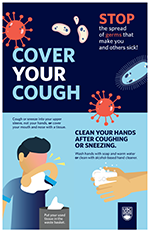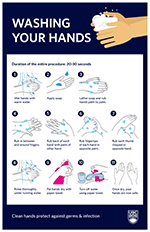Pandemic
A pandemic is a global outbreak of an infectious disease that spreads across countries and continents, affecting a large number of people. While pandemics can range in severity from mild to severe, the term refers to how widely and rapidly a disease spreads, not how dangerous it is.
According to the World Health Organization (WHO), a pandemic is declared when there is increased and sustained transmission of a disease within the general population across multiple regions. During a pandemic, organizations, including educational institutions, governments, and businesses implement measures to limit the spread of disease and protect public health.
At UBC, Safety & Risk Services works with campus partners to lead response efforts. Working groups are convened as needed to monitor developments, create response plans, and guide decision-making to help keep the UBC community safe.
Engage in healthy habits
We each have a personal responsibility to assist in mitigating an emergent public health threat. Help prevent the spread of illness by adopting the following everyday practices:
- Wash your hands often with soap and water for at least 20 seconds.
- Use an alcohol-based hand sanitizer when soap and water are unavailable.
- Avoid touching your face (eyes, nose, and mouth) with unwashed hands.
- Clean and disinfect frequently-touched objects and surfaces.
- Cover your cough or sneeze with a tissue. If you don’t have a tissue, cough or sneeze into your upper sleeve or elbow, not your hands. Dispose tissues immediately and wash your hands afterwards.
Download and post the healthy habits posters in your area
Reduce contact
- Avoid close contact with anyone showing signs of illness.
- Stay home when you are sick, except to get essential medical care.
- Limit time in crowded areas such as transit, theatres, concerts and large gatherings/events.
- If you suspect you have been infected, self-isolate and contact a healthcare professional.
Stay informed
During a pandemic there is a lot of information circulating about the disease. Access reliable sources for the most up-to-date information
- The World Health Organization
- Public Health Agency of Canada
- British Columbia Centre for Disease Control
- For UBC specific information: ubc.ca
Seek medical advice
If you are experiencing symptoms call your health provider or public health service before you go to the doctor’s office or emergency room. Make sure to mention your symptoms and recent travel history.
- Call 8-1-1 for BC’s Provincial Health Line (HealthLink BC).
Travel appropriately
Before travelling, refer to government travel advisories at www.travel.gc.ca to make informed decisions while abroad.
- Canadian citizens can register their travel with the Canadian government website.
- UBC student, faculty, and staff should book travel through UBC’s online booking and employee profile system Concur or contact and advisor at Direct Travel.
- UBC partners with International SOS (iSOS) for travel safety. Learn more about support and country-specific advice.
Did you find what you were looking for?
Thanks for your response! If you'd like to share further feedback, please take our survey.
Didn’t find what you were looking for? We’d like to hear from you! Share your thoughts by taking our survey.

